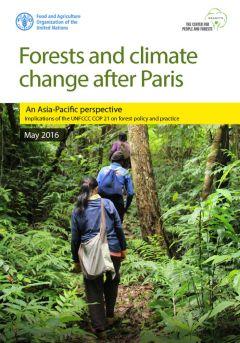Focal point
Location
The Food and Agriculture Organization of the United Nations leads international efforts to defeat hunger. Serving both developed and developing countries, FAO acts as a neutral forum where all nations meet as equals to negotiate agreements and debate policy. FAO is also a source of knowledge and information. We help developing countries and countries in transition modernize and improve agriculture, forestry and fisheries practices and ensure good nutrition for all. Since our founding in 1945, we have focused special attention on developing rural areas, home to 70 percent of the world's poor and hungry people.
Members:
Resources
Displaying 1306 - 1310 of 5074Forests and climate change after Paris - An Asia-Pacific perspective
The 21st Conference of Parties (COP 21) of the United Nations Framework Convention on Climate Change (UNFCCC) was held in Paris, France, 30 November to 11 December 2015. COP 21 and the resulting Paris Agreement have been seen by many as a turning point in international climate negotiations. Their implications have been particularly significant in the context of forests. In view of this, forest sector stakeholders in Asia and the Pacific require succinct and accurate information on the outcomes of COP 21 and the Paris Agreement.
Prácticas de manejo para el uso múltiple sostenible en bosques comunitarios de la Amazonía peruana. Guía para el facilitador
Esta guía ha sido diseñada con el objetivo de desarrollar en los pueblos indígenas capacidades para la gestión de sus bosques de forma eficiente y competitiva, pero respetando sus propios intereses como pobladores, administradores y usuarios de los bosques y sus recursos, así como su identidad cultural marcada por tradiciones ancestrales que impregnan su convivencia y su relación con los recursos naturales.
Le rôle des femmes dans la gestion des ressources en eau agricole – Phase 2
This paper presents the results of a follow-up project in Algeria and Tunisia on the development of gender-sensitive indicators related to the role of women in agricultural water management. The paper summarizes the results of the “Phase 1” project, then presents the results of two studies conducted in Algeria and Tunisia on institutional level actors dealing with agricultural water management and national-level sex-disaggregated data.
Renforcement de l’efficacité et de la durabilité des investissements hydroagricoles pour lutter contre la pauvreté
Ce projet vise à améliorer la sécurité alimentaire et á réduire la pauvreté rurale des petits agriculteurs en fournissant des conseils et un soutien technique pour améliorer la qualité, l'impact et la durabilité des investissements dans le cadre de la gestion de l’eau à usage agricole (GEA). L’eau est essentielle au développement économique et comme moyen d’existence et joue un rôle central dans la réduction de la pauvreté rurale.
Apoyo de ONU-REDD y ejemplos nacionales sobre la preparación legal para la REDD+
The publication is a small easy to read information booklet laid out in short blocks of text and colourful photographs. It provides clear information in reply to three questions: What is legal preparedness for REDD+? Why are adequate legal frameworks important for the success of REDD+? and Where to start? It concludes with a paragraph under 'UN-REDD support on legal preparedness'.







